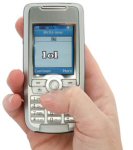Online slang: fad or here to stay?

Will online slang like OMG, IMO, lol, and LMHO fizzle out like a fad or remain with us indefinitely.
According to Wictionary, “A fad is something that is very popular with a small group of people for a short period of time.”
Take a look at the last century of fads, and see if you can find a common bond.
Silent Films (1900s), Foxtrot (10s) Pez (20s), zoot suits (30s) slinkys (40s), hula-hoops (50s), troll dolls (60s) pet rocks (70s), Big hair (80s), tickle me elmo (90s), online slang (20s)
Among those who participate in fads, there is a camaraderie, a sort of club membership (remember M embers Only jackets) in participating in the current popular phenomenon. Those left out are often labeled as uncool or nerdy. So do you have to conform with the mainstream to join a fad? Not necessarily. Many counterculture fads exist: from lip piercing to Mohawks.
embers Only jackets) in participating in the current popular phenomenon. Those left out are often labeled as uncool or nerdy. So do you have to conform with the mainstream to join a fad? Not necessarily. Many counterculture fads exist: from lip piercing to Mohawks.
Some fads are propelled by marketers like the Black Friday ads for Tickle Me Elmo, and  some occur spontaneously like holding up cell phones at concerts. Either way a fad is fun and rewarding for those who join in.
some occur spontaneously like holding up cell phones at concerts. Either way a fad is fun and rewarding for those who join in.
What do you think about textspeech or online slang? Are you a member of this “club”? Will these acronyms spread to the unplugged? Do you use these abbreviations at all, just for texting, on all online communication, or all printed communication?
Do you ever use online slang in oral communication? If you feel like it, leave me a comment. I’d love to hear from you about this.













INteresting article.
I don’t think that i have ever used Online slang in oral communication except for when I’m making a point about it.
However common online, the real beneficial use of many of these are in short messaging, first cellphones and now short message sites like Twitter are seeing it increasing heavy.
I think that the language as such is going to change to adapt to it. 50 years ago. When someone said Ram, they meant a male goat, today, almost no one will make that association unless the speaker is dressed in camouflage and sporting a gun.
Most of these abbreviations will probably never make it into mainstream conversations because they depict non verbal communication. Smileys, LOL’s and all the other things that come across naturally in face to face or phone conversations.
I for one think that its use will become more widespread because of its connection to the text message. Something that i feel has become a norm of interpersonal communication.
I hate all that slang. It really annoys me when I receive a text message filled with it. Most times I don’t even read it, just hit the delete button. If it’s that important whoever sent it can phone me, or send me a message is some sort of cohesive English.
I agree with Jon, it’s ridiculous and I don’t see it expanding beyond short messages that pretty much have to be abbreviated in such a way.
I heard my 16-yr-old niece use “owned”, as in “He really got owned”. Her grandparents were present and thankfully didn’t understand–I forget now what the subject was under discussion–but the conversation quickly passed to less perilous regions.
lol omg, i DO use this stuff all the time! not really. but yes, as a professional writer/editor, I do try to be careful with my email vocabulary, (not to mention my e.e. cummings-esque preference for a lack of capitalization). I agree with everything folks are saying about the sadness of this erosion of our language… but… I do think language is meant to evolve. Do I hope to see lol in “regular” writing – not unless it’s a novel about chat, but do I hope we can agree on the proper way to cite a Web site or e-mail (i.e., is it E Mail, email, e-mail, etc., etc.) sometime in the next few years. Likewise as far as “regular” text goes, well that’s changing too, isn’t it?
Just as folks are reading more blogs and texts than novels and newspapers (for better or worse, it’s happening), so too is what’s “normal – changing, again for good or bad.
Two other quick points:
1) I will say I started paying much closer attention to the way I use language online when the then 8-year-old son of a man I was seeing got an email address. Suddenly, I typed in complete sentences, with correct punctuation and capitalization. I guess if bad grammar was the worst a child saw online….
2) When I was dating and trying online dating sites, too many “alots” or similar grammar errors that aren’t just typos or emoticons and I was outtie. so to speak!
great post!